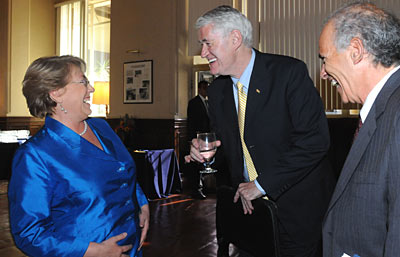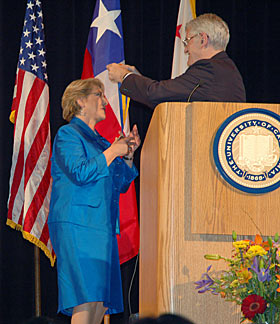UC Berkeley Web Feature
 |
Chilean President Michelle Bachelet (left) enjoys a light moment with Chancellor Robert Birgeneau (center) and Harley Shaiken, director of the campus Center for Latin American Studies. (Peg Skorpinski photo) |
An alliance for green prosperity?
On a visit to Berkeley and LBNL this week, Chilean President Michelle Bachelet emphasized the value of collaboration between her nation and the state of California
BERKELEY – Now that democracy has taken firm root in her nation, Chilean President Michelle Bachelet came to Berkeley Thursday in search of solutions to one of the fast-developing nation's most pressing challenges: how to provide its own energy.
| For more information... |
The visit is likely to produce collaborative efforts between Chile and Berkeley's Energy Research Institute on things like wind turbines, energy-efficiency programs, and solar-power development to help Chile reduce its dependence on imported fuel and keep energy prices from reversing progress made to date in reducing poverty, said Berkeley's Kammen, who presented Bachelet with research on the strides California has made toward energy efficiency and on renewable-energy production as an economic stimulus in both rural and urban areas.
 Chilean President Michelle Bachelet receives the Berkeley Medal, the highest honor offered by UC Berkeley, from Chancellor Robert Birgeneau. Bachelet capped off a long day of visits to Sacramento, Davis, and the Bay Area with an address at UC Berkeley on Thursday evening sponsored by the Center for Latin American Studies. (Kathryn Bader/UC Berkeley photo) |
"In contrast to the 1960s and 1990s, we have not come here to ask for aid," she told the audience. "We have come to form an association between Chile and California as part of a new relationship."
Bachelet, South America's first woman president elected in her own right, spoke at the end of a day focused on strengthening Chile's longstanding bonds with the state of California and UC now that the dictatorship of Augusto Pinochet is almost two decades in the past.
Before arriving at Berkeley, she met Gov. Arnold Schwarzenegger at UC Davis, where their representatives signed an agreement establishing a California-Chile "Partnership for the 21st Century," calling for collaboration among their institutions, universities, corporations, and citizens.
The agreement is designed to "solidify the already strong relationship between our state and Chile," Schwarzenegger said.
Bachelet also signed agreements with the Davis campus for cooperative efforts centered on agriculture and winemaking.
At International House, Bachelet filled the 400-seat auditorium beyond capacity, and a long line of people was turned away when free tickets ran out. The event was sponsored by the Center for Latin American Studies.
Some attendees, like Veronica Lopez, a graduate advisor in the Spanish and Portuguese department, had left Chile during the Pinochet regime, which lasted from the assassination of Socialist President Salvador Allende in 1974 until democracy was restored in 1990.
She was thrilled to be there for Bachelet's appearance, which she called a "a big deal."
The Chilean president's father was tortured and died in prison at the hands of the Pinochet regime. Bachelet herself, then in her early 20s, and her mother were tortured too, then sent into exile.
That she could win election as Chile's president in 2006, as part of the ongoing Concertacion left-center coalition, held deep symbolic value for Chileans. Bachelet, a pediatrician by training, won the post after serving as health minister and then defense minister in the government of her predecessor, Ricardo Lagos.
Her appearance also drew small groups of protesters seeking to draw attention to a range of Chilean issues, including education problems, plans to build hydroelectric dams on rivers, efforts by the indigenous Mapuche people to reclaim their historic lands, and the recent arrest of a documentary filmmaker who was chronicling the Mapuche story.
Security — each person entering was scanned with an electronic wand, and purses and briefcases were sniffed by a bomb-detecting dog — kept people waiting to enter for almost an hour past the announced 5 p.m. starting time. Because Bachelet was almost an hour late arriving from LBNL, though, the painstaking security measures didn't keep people from hearing her speak.
Introducing her, CLAS chair Harley Shaiken said, "President Bachelet, your lifelong commitment to human rights and democratic values, often at great personal cost, have a special relevance and meaning at this unique university."
He added, "The Chile-California agreement could be a cornerstone of something that becomes an alliance for green prosperity throughout the Americas."
Before Bachelet spoke, Chancellor Robert Birgeneau presented her with the Berkeley Medal, the campus's highest honor, for "a career that embodies integrity, moral courage, and democratic values, all of which reflect the ideals of the University of California at Berkeley."
Birgeneau welcomed Bachelet as "a head of state but also as extended family," telling the audience that two of her nephews — Chris and Andre Bachelet — graduated from Berkeley in the 1990s and are remembered here as rugby stars.
Bachelet accepted the medal "in recognition of the courage and dignity shown by the millions of Chileans I represent."
In her speech, Bachelet called on California and the rest of the developed world to look on Chile, and the rest of the developing world, in a new way. More people's lives are improving than has ever been possible in human history, she said. Instead of feeling threatened, the developed world should look beyond the risks presented by globalization to the opportunities it offers.
"If we ignore these challenges, the costs will increase and we'll move toward an world that is less governable and certainly more dangerous," Bachelet said.
"My friends of the University of California at Berkeley, our fundamental challenge in this new era is to effectively fulfill our responsibilities together, both developed and developing nations," she added. "We must demonstrate that human beings are capable of making progress, that we can construct a 21st century that is better than the 20th."

